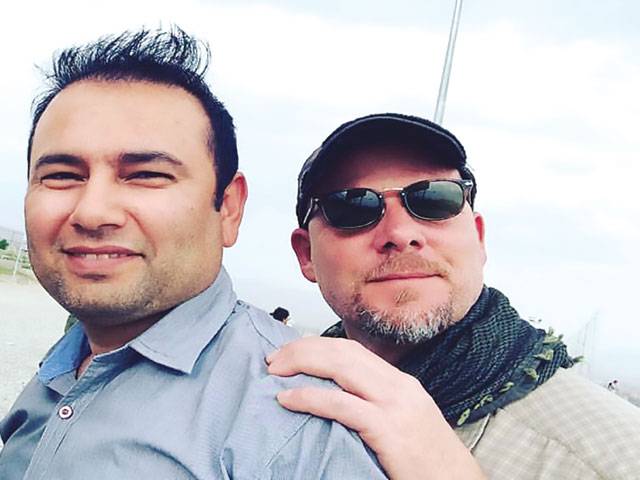WASHINGTON - Award-winning American journalist David Gilkey and his translator were killed Sunday while traveling with an Afghan army unit that came under fire in southern Helmand province, in a sign of just how dangerous the conflict remains for the media trying to cover it.
The translator was identified as Zabihullah Tamanna, 38. Two other National Public Radio journalists traveling with Gilkey in a separate vehicle, reporter Tom Bowman and producer Monika Evstatieva, were unharmed. NPR said the vehicle in which Gilkey, 50, and his translator were traveling was struck by shellfire near the town of Marjah.
A Taliban hotbed, the opium-rich province of Helmand is almost entirely under the control of insurgents.
"David has been covering war and conflict in Iraq and Afghanistan since 9/11. He was devoted to helping the public see these wars and the people caught up in them. He died pursuing that commitment," said Michael Oreskes, NPR's senior vice president of news and editorial director. "As a man and as a photojournalist, David brought out the humanity of all those around him. He let us see the world and each other through his eyes."
The Committee to Protect Journalists, a press freedom group, said that prior to the deaths of Gilkey and Tamanna, 24 journalists and one media worker have been killed in Afghanistan since 2001 US-led invasion. Reports said Gilkey was the first non-military American journalist killed since the start of the conflict.
"Even though much of the world's attention has shifted away, let no one doubt that Afghanistan remains a dangerous place for journalists -- local and foreign -- working to cover that protracted conflict," said Bob Dietz, CPJ's Asia program coordinator. "We are deeply saddened by the deaths of Zabihullah Tamanna and David Gilkey. There are too many journalists who have given their lives to tell the Afghan story."
Gilkey's colleagues responded with shock at the news of his sudden death, the first time in NPR's 46-year history that it has lost a journalist on a reporting assignment. Lulu Garcia-Navarro, NPR's South America correspondent who previously served as Iraq and Middle East bureau chief, said on Twitter: "We honor our dead. We remember them. We know that their work lives on. It's not enough though. We mourn. #davidgilkey#ZabihullahZamanna."
"Where to begin. This is an unimaginable loss. David Gilkey was one of our greatest journalists," tweeted "All Things Considered" co-host Audie Cornish.
US Secretary of State John Kerry praised the "gifted storyteller," noting that "this attack is a grim reminder of the danger that continues to face the Afghan people, the dedication of Afghan national defense and security forces to securing their country and of the courage of intrepid journalists -- and their interpreters -- who are trying to convey that important story to the rest of the world."
Gilkey received a 2007 national Emmy award for a video series about Michigan Marines in Iraq. "The things to do were amazing and the places to see were epic," he once said. "But the people, the people are what made it all worth the effort."
His photography helped earn NPR a Peabody Award for its coverage of the Ebola epidemic. "His coverage in Africa put a face to a disease and refused to let listeners think of the stricken individuals as separate from our own families," NPR said, with images that captured both the dangers and intensity of the battlefield and quiet life in villages and on bases. "He made a global story very personal."
A "devastated" NPR president and CEO Jarl Mohn said "horrific incidents like this remind us of the important role journalists play in America's civic life. They help us understand beyond the headlines and see the humanity in others."
The well-respected journalist received many accolades, including being named Still Photographer of the Year by the White House Photographers Association in 2011 -- among 36 distinctions, including nine first place awards, he received from the group since 2009. His role in an NPR investigation on veteran medical care helped the outlet earn a 2010 George Polk Award, Society for News Design's 2011 Award of Excellence and a 2011 Dart Award for Excellence in Coverage.
Last year, he was honored with the Edward R. Murrow Award for his coverage of international breaking news, military conflicts and natural disasters -- the first time the Corporation for Public Broadcasting presented the prize to a multimedia journalist.
Gilkey also received a 2007 national Emmy award for a video series "Band of Brothers" about Michigan Marines in Iraq. In 2004, he was named Michigan "Photographer of the Year" by the Michigan Press Photographers Association.






